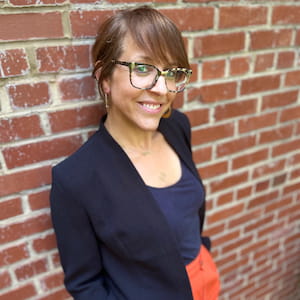Nicole Angotti Associate Professor Sociology
- Additional Positions at AU
- Associate Director, Center on Health, Risk, and Society
- Degrees
- PhD, Sociology, University of Texas at Austin
MA, International Educational Development, Teachers College, Columbia University
BA, Sociology, University of California, San Diego - Bio
- Nicole Angotti’s research sits at the nexus of population health and medical sociology. Her work addresses cultural, social, and institutional dimensions of health and wellbeing that produce differences in how individuals and populations experience epidemics, with a focus on four cross-cutting themes: the differential incorporation of global health interventions into local contexts; social and political consequences of epidemics; health and wellbeing across the later life course; and the social production of demographic data and knowledge about health. Some of the issues she has addressed in her work include the implementation of Western HIV testing norms in rural African health facilities; the unintended consequences of global HIV interventions targeting pregnant women and sexual minorities; the sexual life course trajectories and HIV vulnerability of older adults; and how and why different modes of data collection yield different answers to similar research questions. Angotti has published in top journals, including American Journal of Sociology, Gender & Society, Social Science & Medicine, Culture, Health & Sexuality, Qualitative Sociology, and Population and Development Review, and her research has been funded by the National Science Foundation, the National Institutes of Health, and the DC Center for AIDS Research (DC CFAR). She is working currently on new projects, in the U.S. and rural South Africa, focused on intergenerational approaches to addressing the vulnerabilities to health, wellbeing and livelihoods security associated with aging alone (or with minimal support) and youth underemployment. Angotti is affiliated with the School of Public Health at the University of the Witwatersrand in South Africa, where, before joining AU, she was a Hewlett Foundation Postdoctoral Fellow with the African Population Studies Research and Training Program.
- See Also
- HIV after 40: Aging in the Context of an HIV Epidemic
- Verbal Autopsy
- DC Center for AIDS Research
- For the Media
- To request an interview for a news story, call AU Communications at 202-885-5950 or submit a request.
Teaching
Summer 2024
-
SOCY-335 Birth and Death
Fall 2024
-
SOCY-375 Gender, Poverty and Health
Partnerships & Affiliations
-
MRC/Wits Rural Public Health and Health Transitions Research Unit (Agincourt), School of Public Health, Faculty of Health Sciences, University of the Witwatersrand (South Africa)
Honorary Senior Researcher -
Maryland Population Research Center, University of Maryland College Park
Visiting Associate Research Professor -
Center on Health, Risk and Society
Associate Director, Faculty Affiliate -
Global Health and Development sub-section, ASA Development Sociology section
Member -
DC Center for AIDS Research (DC CFAR)
Investigator -
Maryland Population Research Center, University of Maryland College Park
Visiting Associate Research Professor
Scholarly, Creative & Professional Activities
Selected Publications
For full listing of publications, see Google Scholar
Angotti, Nicole, Sanyu Mojola, Yunhan Wen and Abby Ferdinando (2023). “Biomedical Bargains: Negotiating “Safe Sex” on Antiretroviral Treatment in Rural South Africa.” Social Science and Medicine https://doi.org/10.1016/j.socscimed.2023.116036
Mojola, Sanyu A, Nicole Angotti, Enid Schatz and Brian Houle (2022). “A Nowadays Disease”: HIV/AIDS and Social Change in a Rural South African Community. American Journal of Sociology, 127(3)
Angotti, Nicole, Tara McKay and Rachel Sullivan Robinson (2019). “Lgbt Visibility and Anti-Gay Backlash: Unintended Consequences of Responses to HIV/AIDS in Malawi and Senegal” Sociology of Development, Special Issue on Global Health and Development, 5(1), 71-90
Mojola, Sanyu and Nicole Angotti (2019). “’Sometimes it is not about men’: Gendered and Generational Discourses of Caregiving HIV Transmission in a Rural South African Setting” Global Public Health, Special Issue on African Voices in Global Health: Knowledge, Creativity, and Accountability, 1-13
Angotti, Nicole, Sanyu Mojola, Enid Schatz, Jill Williams and F. Xavier Gómez-Olivé (2018). “’Taking Care’ in the Age of AIDS: Older Rural South Africans’ Strategies for Surviving the HIV Epidemic” Culture, Health & Sexuality, 20(3), 262-275
Sennott, Christie and Nicole Angotti (2016). “Reconsidering Gendered Sexualities in a Generalized AIDS Epidemic” Gender & Society, 30(6), 935-967
McKay, Tara and Nicole Angotti (2016). “Ready Rhetorics: Political Homophobia and Activist Discourses in Malawi, Nigeria and Uganda” Qualitative Sociology, Special Issue on Gender and Globalization, 39(4), 397-420
Angotti, Nicole, Margaret Frye, Amy Kaler, Michelle Poulin, Susan Cotts Watkins and Sara Yeatman (2014). “Popular Moralities and Institutional Rationalities in Malawi’s Struggle Against AIDS” Population and Development Review, 40(3), 447-473
Angotti, Nicole and Amy Kaler (2013). “The More You Learn the Less You Know? Interpretive Ambiguity Across Three Modes of Qualitative Data” Demographic Research, 28(33), 951-980
Angotti, Nicole, Kim Yi Dionne and Lauren Gaydosh (2011). “An Offer You Can’t Refuse? Provider-Initiated HIV Testing and Antenatal Care in Rural Malawi” Health Policy and Planning, 26(4), 307-315
Angotti, Nicole (2010). “Working Outside of the Box: How HIV Counselors in sub-Saharan Africa Adapt Western HIV Testing Norms” Social Science and Medicine, 71(5), 986-993
Angotti, Nicole, Agatha Bula, Lauren Gaydosh, Eitan Zeev Kimchi, Rebecca Thornton and Sara Yeatman (2009). “Increasing the Acceptability of HIV Counseling and Testing with Three C’s: Convenience, Confidentiality and Credibility” Social Science and Medicine, 68(12), 2263-2270
Research Interests
Cultural, social and institutional dimensions of health and wellbeing; Population studies; Aging & later life course; HIV/AIDS; Gender/sexuality; Development/social change; Global/transnational processes; Field research methods; Africa
Grants and Sponsored Research
Principal Investigator (with F. Xavier Gomez-Olive), "Intergenerational Intervention: Employing Youth to Promote Aging Healthy with HIV in Rural South Africa" - National Institute on Aging (NIA/NIH)
Co-Investigator (PI of AU sub-award), "Verbal Autopsy: Reimagining Data and Automated Cause Assignment (using ALPHA network data)” - National Institute of Child Health and Human Development (NICHD/NIH)
Principal Investigator, “HIV after 50 in its Chronic Era in Rural South Africa” - District of Columbia Center for AIDS Research (DC CFAR)
Co-Investigator (PI of AU sub-award), “HIV after 40 in Rural South Africa: Aging in the Context of an HIV/AIDS Epidemic” - National Institute on Aging (NIA/NIH)
